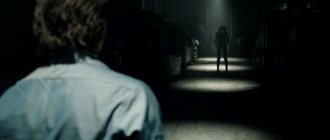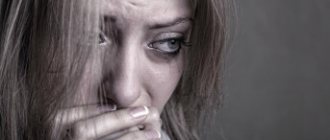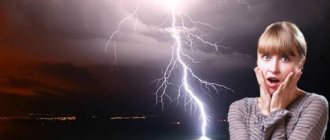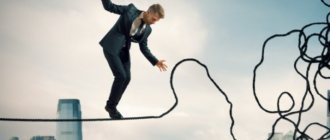The so-called “ancestral memory” makes people afraid of the dark. Firstly, the instinct of self-preservation is triggered, since danger may, purely hypothetically, lurk in the darkness. Secondly, a person intuitively avoids everything unknown, and in the darkness he loses his main analyzer - vision. So it’s quite normal not to walk down a deserted and unlit alley at midnight; startle from loud, incomprehensible sounds during sleep; not falling asleep for a long time because of watching a horror movie. But sometimes the fear of the night becomes irrational, far-fetched, groundless and subjugates a person’s will, thoughts and emotions. In such cases, a diagnosis is made - nyctophobia.
What it is
Many people don't even know what the scientific name for fear of the dark is. It turns out she has several names:
- nyctophobia is a pathological fear of the night (translated from ancient Greek “η νύχτα” - “night”, “φόβος” - “fear”);
- scotophobia is a panicky fear of the dark (translated from the ancient Greek “σκοτος” - “darkness”).
Next to these concepts, two more are often used - achluophobia and ecluophobia, which are interpreted as fear of the dark. However, their origin is unknown. If, in order to find out, we delve into historical linguistics, they can go back to one source - the word “axla”, which meant creatures from the afterlife. They accompanied a person to the “field of peace” - to death or sleep. But this is only a version unconfirmed by science, although quite substantiated.
There is a very fine line when it comes to the question of what is the difference between achluophobia and nyctophobia or between scotophobia and nyctophobia. Nyctophobes are afraid of nightfall. It is at this time of day that they begin to have panic attacks and seizures. Scoto- and achluophobes fear the darkness itself. They can get scared even during the day when they enter a room without light.
Who or what is a person suffering from these phobias afraid of? They are not afraid of the darkness itself, but of what can happen in it or who is in it. They have such a developed imagination that their sensitive nature comes up with various scary stories that are about to happen and imagines creepy monsters.
Manifestation of achluophobia in children
It is as a child that a person first encounters the fear of the dark - achluophobia. It manifests itself due to emotional instability and overdeveloped imagination.
Factors influencing the development of fear of the dark:
- being alone in a dark room;
- absence of a parent during moments of panic;
- overly demanding parents;
- presence of fear of the dark in one of the parents;
- excessive care and anxiety among parents;
- single-parent family;
- conflicts in the family;
- unfavorable living conditions;
- individual character traits.
Left completely alone at night, the child begins to invent the appearance of terrible monsters and strange objects. A feeling of danger arises, developing into a fear of the dark. This feeling is so strong that the baby may ask his parents not to turn off the light or stay with him until he falls asleep. Ignoring fear of the dark can lead to insomnia and depression.
There are many reasons for the development of fear of the dark in a teenager, including:
- experienced feeling of fear due to watching a horror film;
- a previously experienced unpleasant situation;
- possible fear.
If parents notice in time the development of pathological manifestations of fear of the dark, then it will be much easier to eliminate the problem in childhood. The psyche of a young child is more flexible and much easier to treat by a psychotherapist. Thanks to modern methods of combating phobias, children undergo treatment very favorably. Psychologists conduct game trainings in which the child is actively involved and completes assigned tasks. If you do not seek help in time, the harbingers of nightmares can trigger the development of psychosis.
Causes
The most common causes of nyctophobia and scotophobia are:
- childhood trauma associated with darkness or a room without light;
- overdeveloped imagination;
- increased emotionality, sensitivity, vulnerability;
- prolonged stress;
- existential fear of death;
- heredity;
- inert nervous system;
- features of upbringing: overly strict parents, or permission to watch horror films from early childhood, or their increased anxiety and nervousness, which are passed on to the child.
Nyctophobia often occurs against the background of various mental disorders. For example, in schizophrenia. Although there are also frequent reciprocal cases when pathological fear leads to psychopathy, weakening the nervous system and keeping a person in constant tension.
Childhood nyctophobia
In children 3-4 years old, fear of the dark is normal. But if it persists after 5 years, then it is considered a pathology that requires the intervention of a psychotherapist. First of all, you need to find out the reason.
Why does a child become afraid?
- got very scared in the dark;
- constantly hears from parents scary stories that happen at night;
- read a creepy book, watched a horror movie, someone told a “horror story” - this makes a strong impression on the sensitive child’s psyche, and they begin to fear monsters in the dark;
- often stays at home alone at night;
- is experiencing severe stress (due to studies or parental divorce);
- he has nightmares;
Never force children to overcome their fear (for example, do not lock them in a dark room). This will only make the situation worse. You can't make fun of them for being afraid of a monster that doesn't exist. Because of this, internal complexes and incorrect behavior patterns are formed.
When does fear become conscious?
- Children who sleep alone experience fear of the dark more often than others. Therefore, indirectly, the fear of darkness is the fear of loneliness. Even newborns can experience it.
- If parents are into horror stories. “If you don’t eat porridge, I’ll call Babai” or “If you don’t stop playing around, an evil sorcerer will come for you!” In the dark, when a child relaxes before going to bed and mentally, like adults, replays the day’s experiences in his head, it is this “Babai” or “evil sorcerer” that can materialize in the child’s imagination in a dark room.
- If elders watch horror films in the presence of a child, they tell creepy stories. Remember, the brain of a child, even a small and unintelligent one, captures vivid images and then reproduces them at the most inopportune moment.
- If a child often watches news broadcasts with adults. Any randomly seen image in a story about a disaster, murder or attack can cause fear of the dark.
- If the child is prohibited from doing too much.
- If serious conflicts flare up in the family, in which children are drawn into.
In addition, the fear of the dark is often characteristic of children of “adult” parents. The older the mother is at the time of the birth of the child, the more she and her household worry about the “late” baby. They run at the first call, ooh and ahh and throw up their hands. As a result, they grow up with a neurasthenic, easily excitable, infantile baby, very susceptible to fears, and not just the dark.
Children from single-parent families are often afraid of the dark. Moreover, the first “bells” of fear come, as a rule, during the period when one of the parents leaves.
Signs of a phobia
The most pronounced sign of scotophobia/nyctophobia is a person persistently avoiding any darkness. Towards evening, he turns on the lights everywhere and leaves them on while he sleeps, does not go out late, does not go into rooms where it is twilight. Often justifies his actions to others. Talks about poltergeists, murders in alleys without streetlights and sleep apnea.
The sufferer's symptoms manifest themselves on two levels - mental and physiological.
Psychological:
- non-recognition of one’s pathology (it is the nyctophobe who will claim: “I’m not afraid of the dark! I’m not sick! I don’t need help!”):
- fear of being alone at home at night;
- without light - a feeling of hopelessness, despair;
- dark alleys, streets and parks are avoided even in company: a nycphobe will foam at the mouth to convince everyone of their danger;
- TV or radio is on all night;
- panic attacks when suddenly turning off the lights or entering a dark room;
- at night the door to the bedroom does not close, the curtains do not close, some kind of dim light (night light) is constantly on;
- searching for an explanation for your phobia;
- talking to yourself out loud;
- loss of self-control - inadequate, passionate desire for light;
- irrational, inexplicable rituals performed to prevent imaginary threats from the darkness.
Physiological (manifest when entering darkness, at night):
- a sharp rise in pressure;
- rapid pulse;
- tachycardia;
- muscle weakness;
- hysterics;
- tremor, trembling, chills;
- headache;
- stunned;
- loss of voice, stuttering;
- increased sweating;
- stale breath;
- insomnia, sleep apnea, nightmares;
- pain in the abdomen.
Stages of disease development:
To successfully treat nyctophobia, psychotherapists break the chain of development of the disease in the sensation-consolidation-feeling section.
Symptoms
The main sign of nyctophobia is strong emotional stress in the dark. A person becomes very sensitive, listens to every sound, peers into every shadow, constantly expecting something terrible to happen.
An attack of fear is accompanied by unpleasant physical symptoms:
- increased heart rate;
- increased sweating;
- nausea and feeling of a lump in the throat;
- abdominal pain;
- feeling of chills or heat;
- dizziness;
- tremors, heaviness and pain in various parts of the body.
In severe cases, a person may experience sleep problems and panic attacks during which he cannot control himself. In some cases, an individual may fall into a real stupor out of fear.
Fear of the dark test
1. Late evening. You are alone at home. Suddenly the lights went out throughout the entire street. Your actions?
- a) Go to bed.
- b) In a panic, you will start calling someone: the State Electrical Network or someone close to you. As an option, go to your neighbors. Just not to be alone!
- c) Light candles and try to distract yourself: surf social networks on your phone, listen to your player.
You had to return home late at night. It's a 10 minute walk. How will you get there?
- a) Call someone you know, wake them up and insist that they come for you.
- b) By taxi.
- c) You can get there on foot.
At night, do you open the bedroom door wide, leave the curtains open, and turn on the night light?
- a) The door is open, but the curtains are drawn and there is no night light.
- b) Yes it is.
- c) The door is closed, all the lights, even dim ones, are turned off, the curtains are drawn.
Do you watch horror movies at night?
- a) Yes.
- b) No.
- c) You try to watch during the day, but if a situation arises where the company is going to do it in the evening, you will not refuse.
What scares you in the dark?
- a) You are afraid to even talk about it.
- b) Absolutely nothing.
- c) Sometimes you may be frightened by an incomprehensible rustling sound.
Does it take you long to fall asleep?
- a) Not really.
- b) Instantly.
- c) For a very long time.
You woke up from a nightmare. Your actions?
- a) It’s hard for you to imagine this because you’ve never woken up from a nightmare.
- b) Try to fall asleep again.
- c) Drink something calming to help you fall asleep again.
In the dark, do ordinary objects often seem scary and fantastic to you? For example, is the robe a ghost?
- a) Every night.
- b) Sometimes.
- c) Never.
Calculate your points:
Interpretation of results:
- 0-5 points - you are a very brave person who has absolutely no fear of the dark, you have a strong nervous system;
- 6-11 points - you, like many people, are sometimes afraid of sharp sounds and inexplicable rustlings in the dark, but this fear does not go beyond the norm;
- 12-14 points - a state close to nyctophobia, it is worth taking measures to get rid of fear;
- 15-16 points - you suffer from nyctophobia and need to consult a specialist.
Only a psychotherapist can make a more accurate diagnosis.
How to get rid of it?
To clarify the diagnosis, you need to make an appointment with a psychotherapist. If it is confirmed, a strategy and tactics are developed on how and with what to treat nyctophobia. Of medications, only sedatives and sleeping pills are prescribed.
What psychotherapeutic methods are used to get rid of a phobia:
- psychoanalysis;
- Gestalt therapy (if the cause is childhood trauma);
- Rational Emotive Behavioral Therapy;
- art therapy;
- play therapy;
- hypnosis;
- cognitive behavioral therapy.
The most effective way to rid children of nyctophobia and scotophobia is fairytale therapy. The psychotherapist tells instructive stories involving those monsters and fears that frighten a child in the dark. It could even be role-playing games. Gradually, the realization comes to him that this is all made up, which means it’s not scary at all.
The disorder can be overcome on your own if you use the following techniques and techniques.
- Self-reflection
The technique is performed in the first half of the day. Ask yourself: “Why am I afraid of the dark?” On a separate sheet of paper, write down your fears. Re-read each point and evaluate how real and dangerous it is for you. You will see that most of the reasons are completely unfounded. Dispel the myths and convince yourself that nothing threatens you at night.
- Evening rituals
Write down your evening in detail after dark. These should be clear, daily rituals that the body (brain, consciousness) will soon get used to and stop panicking when night falls. What actions are welcome: listen to calm, relaxing music; take an aroma bath with soothing herbs; drink a glass of warm milk; read something good and bright; play with your pet. All this relieves stress and prepares for a good, full sleep.
- Switching
Develop a specific algorithm of actions for what to do when an unaccountable wave of fear begins to roll in. For example: turn on the lights everywhere; Drink a glass of warm water in slow sips; open the window to ventilate the room; call a friend (boyfriend) or go to the neighbors to distract yourself. Write down these step-by-step instructions on paper or on your phone and keep them within reach at all times.
- Confidence
Tell someone that you suffer from scotophobia or nyctophobia. There's no shame in this. Let this be a person you trust, who will never reproach you for being sick, who will not mock you and who will not tell anyone about your problem. It's important to talk to someone.
- "Kill the Monster"
What scares you most often in the dark? If there are rustles or sounds, find their source and try to eliminate it. Noise from the street - install soundproof windows. The cat wanders around the house - for the sake of your own peace of mind, give it to someone you know and keep some fish in the aquarium. The clock is ticking loudly - replace it with others. If, when night comes, monsters are seen in pieces of furniture (hangers, mirrors, ironing boards, curtains), remove these things so that they are not visible from the bed. Or arrange everything so that the lighting falls on them differently (sometimes it is precisely this that distorts the silhouettes beyond recognition).
Independent use of the techniques and methods described above is quite possible, but not always effective. Only a psychotherapist can professionally tell you how to get rid of nyctophobia and fear of the dark forever and in the shortest possible time.
Additional recommendations
What do psychotherapists recommend to nyctophobes in order to somehow reduce the level of anxiety and improve the quality of life:
- Do not watch horror films, do not read creepy and dark works, do not listen to scary stories.
- Don't look at your news feed in the afternoon.
- Breathe more fresh air, exercise, eat right - lead a healthy lifestyle.
- Communicate with pleasant, positive people.
- Don't allow bad thoughts.
- Do yoga, meditation, breathing exercises.
- Arrange the interior of the apartment in light colors. All rooms should have good lighting.
- Listen to pleasant music.
- Before going to bed, give up gadgets.
- Leave the night light on while you sleep.
Most often, a nycphobe is not able to cope with a scourge alone. He needs help and support from loved ones. Therefore, the latter also need to follow some recommendations of psychotherapists:
- do not enter into arguments with a nyctophobe about the fact that his fears are stupid and unfounded;
- do not ridicule his suffering;
- do not focus on the phobia;
- don’t force yourself to overcome your fear;
- Don't treat him like a patient.
Treatment should be comprehensive: work with a psychotherapist + self-reflection + help from loved ones. As practice shows, 2-3 months of such collective work are enough for a complete recovery.
Consequences
If nyctophobia is left untreated, in children it develops into a full-fledged mental disorder by the age of 18. In adults, according to statistics, it is diagnosed in every tenth person. This pathology can have serious consequences for life and health:
- constant stress;
- stroke;
- heart attack and death as a result;
- schizophrenia, various psychopathologies;
- suicide;
- sleep apnea;
- irreversible changes at the chromosomal level, which lead to accelerated aging processes.
As practice shows, by the age of 50-60, nyctophobia disappears by itself. The exception is schizophrenia, which only worsens the course of the disease. Although people with this diagnosis rarely live to this age.
Nyctophobia (scotophobia) is a serious mental disorder that cannot be tolerated and must be treated by a specialized specialist. Otherwise, it will not only ruin the quality of life with constant stress and lack of sleep at night, but will also lead to severe cardiovascular diseases.
Conclusion
Phobias can and should be treated, because they can interfere with normal life more than any physical illness.
How to get rid of anxiety and find peace 0
36
And if some can be ignored or avoided meeting the object of phobia, then darkness is pointless to ignore. Acluophobia should be treated, because only in this way will a person discover all the delights of life, including night walks under the starry sky.










